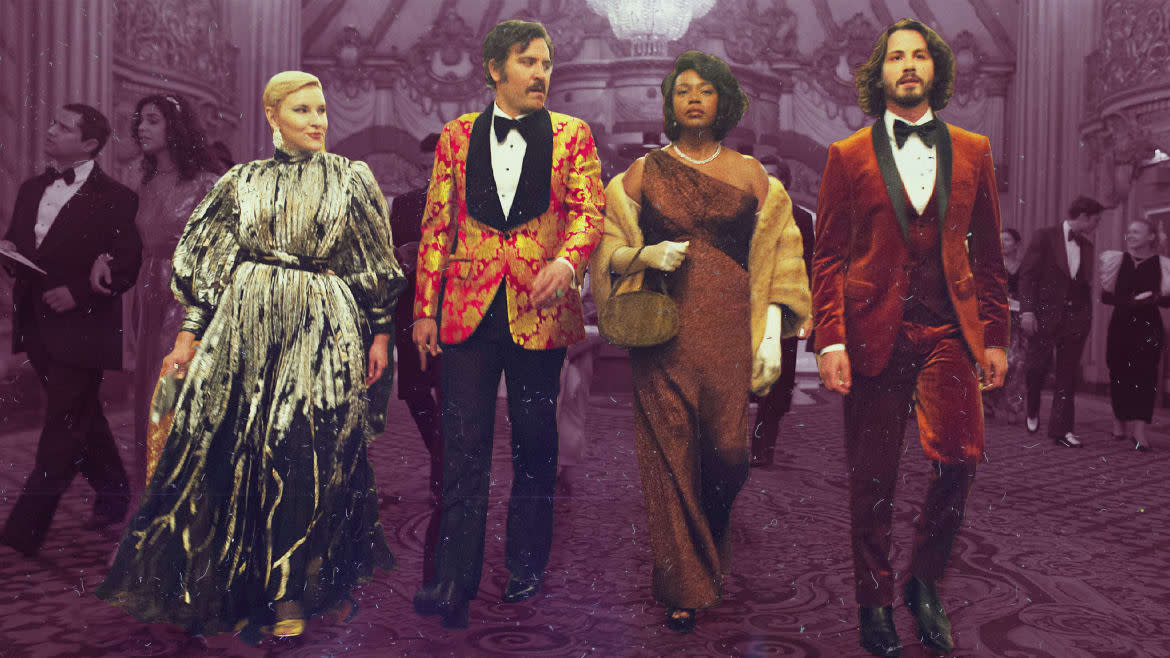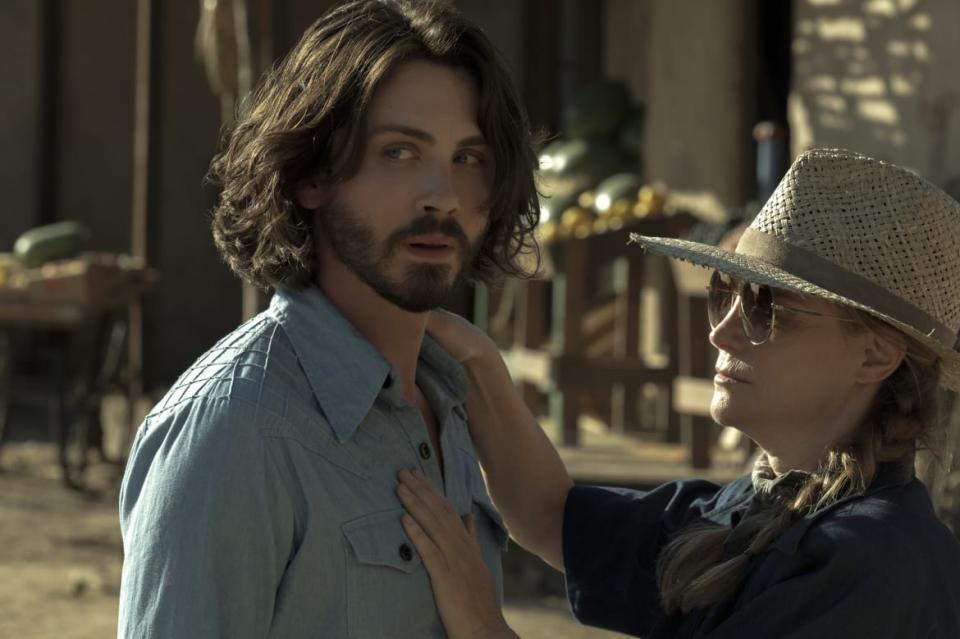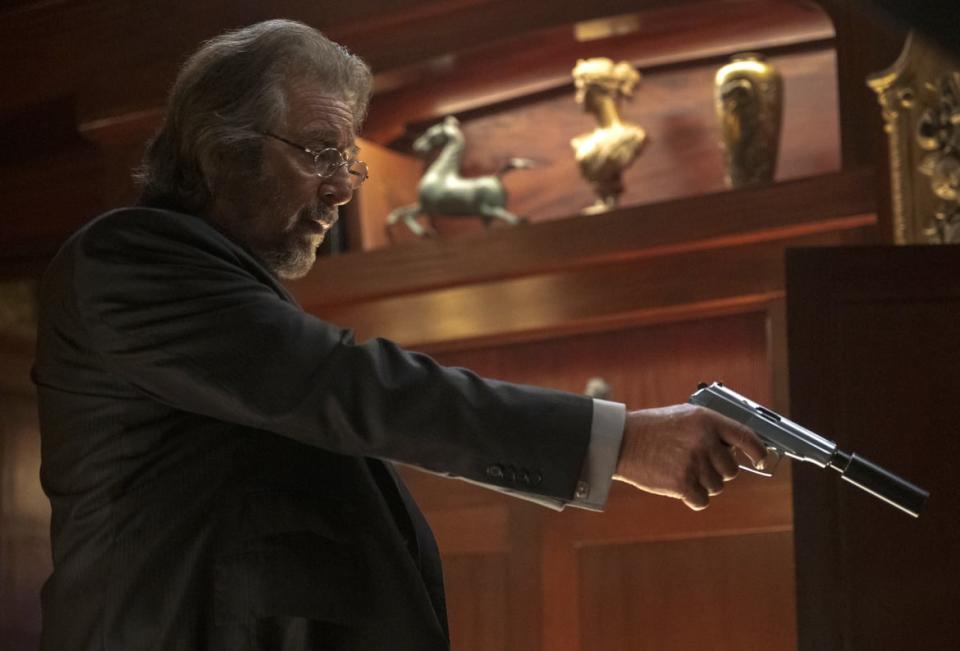‘Hunters’ Season 2: Hitler’s Alive, and Al Pacino’s Nazi Hunters Are on the Case

Hunters pivots around the question: Is killing monsters righteous, or merely the path to becoming a monster yourself? The answer, at least according to the series, is most definitely the former, especially when the fiends are Nazis.
Exploitation with a sharp sting and an aim that’s true, the second and final season of David Weil’s pulpy 1970s Prime Video thriller, out Jan. 13, once again contends that Third Reichers are hiding in plain sight, and that the correct way to handle them is with extreme prejudice—including when it comes to the most infamous 20th-century madman of all, Adolf Hitler.
As was revealed at the conclusion of Hunters’ maiden 2020 season, Hitler (embodied by Udo Kier with grizzled, seething nastiness) is alive in well in this alterna-universe, residing covertly and comfortably in Buenos Aires with the Colonel, aka Eva Braun (Lena Olin), and an army of fanatical minions.
Two years later, the only person who suspects he’s alive is Chava Apfelbaum (Jennifer Jason Leigh), a Nazi hunter who’s the younger sister of Ruth (Jeannie Berlin), the slain New York City grandmother of the show’s hero Jonah Heidelbaum (Logan Lerman). Chava is a ruthless mercenary tracking the Führer, who she suspects is hiding out somewhere in South America. She’s introduced in the premiere following his trail in Austria, where she punishes a former Nazi by removing his eyes and sticking them in a butter sculpture.

The Jewish desire to be seen—as normal people, rather than scheming puppet masters or “vermin”—courses throughout Hunters, and so too does a hunger for Holocaust vengeance. Weil’s series is a comic-book fantasy of powerful, resourceful Jews getting payback against villainous Germans and their heinous collaborators.
At the conclusion of a maiden season that was full of spy missions, shootouts, and sleuthing fit for (and cast in the style of) a B-movie, it delivered an aptly outrageous twist: Meyer Offerman (Al Pacino), the concentration camp survivor who’d brought together Jonah and his multicultural misfit Hunters—movie star Lonny Flash (Josh Radnor), nun Sister Harriet (Kate Mulvany), revolutionary counterfeiter Roxy (Tiffany Boone), Vietnam vet Joe (Louis Ozawa) and Holocaust victims Mindy (Carol Kane) and Murray Markowitz (Saul Rubinek—was exposed as the very Nazi, “the Wolf,” he had supposedly been pursuing. For this unthinkable betrayal, Jonah had inevitably, and rightly, killed Meyer.
Meyer’s death leaves Hunters without the present-day (circa 1979) participation of Pacino, its illustrious force of personality. To compensate, Weil bifurcates the show’s second season, spending half of it on Chava’s partnership with Jonah and his mates, and the other detailing Meyer’s 1975 efforts to both assemble the original team and avoid being outed as a notorious Nazi.
Why Amazon’s Nazi-Killing Show ‘Hunters’ Is So Much More Satisfying Than ‘Jojo Rabbit’
Hope that those two narrative strands will eventually dovetail with—or at least enrich—each other should be tempered, since Pacino’s material is more about filling in past blanks than impacting Jonah’s current predicament. Still, it gives Pacino an opportunity to continue chewing scenery in a thick Yiddish accent, whose exaggerated nature makes more sense in light of Meyer’s status as a phony who’s appropriating the language, mannerisms and customs of the people he persecuted.
Hunters’ primary action reunites Jonah with his estranged comrades, who have scattered in the aftermath of Meyer’s death—a process that allows Weil to spend time fleshing out the backstories and motivations of each of his larger-than-life players. Of them, the most conflicted turns out to be FBI agent Millie Morris (Jerrika Hinton), whose holier-than-thou attitude toward slaughtering Nazis vanishes when she locates and arrests a former SS man posing as a priest, only to witness the legal system set him free for lack of evidence. In response, Millie assumes the role of judge, jury and executioner, and then grapples with guilt over her decision—a state of affairs that compels her to team up with Jonah and company on their quest for Hitler.
Weil laces his drama with relevant debates about the morality of vigilantism, yet it’s all a put-on. Hunters is, at heart, a wild, colorful, violent wish-fulfillment saga about Nazis getting their just deserts—served up via a bullet in the head, if not much worse—courtesy of heroic Jews.
While Jonah and his teammates sometimes feel compunction about slaying their enemies, the series doesn’t really believe there’s a question here, reveling in the punishment of villains who, be they conniving Biff (Dylan Baker) or sadistic Travis (Greg Austin), deserve to be put down like rabid dogs. Consequently, when it comes to Jonah’s new fiancé Clara, the issue isn’t that she may damn him for his work; rather, it’s whether she’ll be able to recognize the nobility of his profession.

There are complications galore in Hunters, ranging from Joe’s situation as a brainwashed minion of his Nazi captors, to Lonny’s bitterness over being rejected by Roxy. Tensest of all, however, is the dynamic between Hitler and his wife, who have different ideas about how best to lead their genocidal movement into the future.
A globe-trotting affair (evoked by an updated title-credit sequence that resembles Risk) that’s a bit less aesthetically flashy than its prior outing, the series’ second season revolves around a collection of Mission: Impossible-style operations that culminate on a siege of Hitler’s compound. That’s not where the show ends, though; in an unexpected one-two punch, its final episodes provide a nightmarish Home Alone-esque fable and a trial that strives to envision whether justice is ever attainable through official channels.
What If the Nazis Won? Inside Amazon’s ‘The Man in the High Castle’
In that closing installment, Hunters falters slightly, not because it doesn’t convincingly follow-through on its act of imagination but because it fails to wrestle with the underlying unjustness of such a procedure in the first place. For all its climactic talk about the need for civilization to avoid becoming that which it abhors, Weil’s show derives its power from its understanding that true evil can’t be reasoned with, rehabilitated or redeemed; it can only be eradicated, or at least viciously combatted whenever it dares to rear its ugly head.
In a powerfully poignant late trek through a tunnel in which Jonah is congratulated, and followed, by the ghosts of his ancestors, Hunters makes clear the virtuousness of his cause. In doing so, the show proves a historical revenge fantasy of piercing contemporary relevance.
Keep obsessing! Sign up for the Daily Beast’s Obsessed newsletter and follow us on Facebook, Twitter, Instagram and TikTok.
Get the Daily Beast's biggest scoops and scandals delivered right to your inbox. Sign up now.
Stay informed and gain unlimited access to the Daily Beast's unmatched reporting. Subscribe now.

